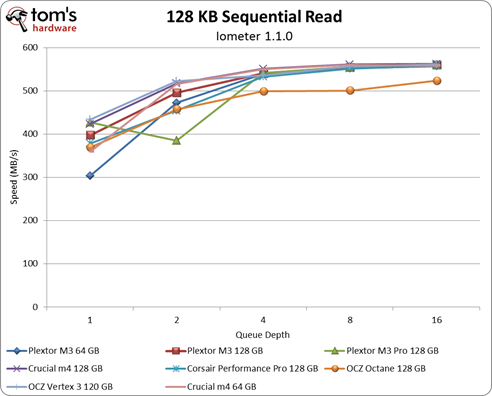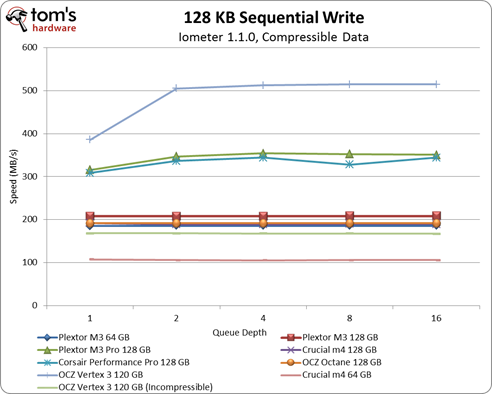Marvell-Based SSDs From Corsair, Crucial, OCZ, And Plextor: Tested
Benchmark Results: 128 KB Sequential Performance
Sequential Read Performance
Examples include file copying, transcoding, game level loading, some gameplay, watching video, and editing video
Crucial's 128 GB m4 almost ties the 120 GB Vertex 3 in 128 KB sequential reads. Plextor's M3 Pro also keeps pace, though it falls behind at a queue depth of two. Meanwhile, Plextor's 128 GB trails by only 20 MB/s at queue depths lower than four.
Corsair's 128 GB Performance Pro exhibits performance characteristics similar to OCZ's 128 GB Octane, but manages to pull away when moving up to four or more outstanding commands. At the lower end of the capacity scale, Crucial's 64 GB m4 clearly beats Plextor's 64 GB M3, with the Crucial SSD surging to ~370 MB/s and the Plextor drive down at 300 MB/s with a single command outstanding.
Sequential Write Performance
Examples include Application Installation, Document Backup
Aside from the standout performance of OCZ's 120 GB Vertex 3 operating on compressible data, this chart is interesting because performance is clearly grouped into two prominent clusters. The 128 GB Corsair Performance Pro and the 128 GB Plextor M3 Pro deliver 300 MB/s in sequential writes right out of the gate, rising to ~350 MB/s as queue depth increases. Both drives demonstrate the impressive performance that a Marvell-based SSD can achieve with optimized firmware and Toggle-mode NAND.
Get Tom's Hardware's best news and in-depth reviews, straight to your inbox.
In contrast, the 64 GB M3, 128 GB M3, 128 GB Octane, 64 GB m4, and 128 GB m4 all achieve similar performance to each other, regardless of queue depth. With the exception of the 64 GB m4, all of these drives deliver about ~200 MB/s in 128 KB sequential writes. The inclusion of the 128 GB M3 in this group might seem a little odd considering it features Toggle-mode NAND, just like the M3 Pro. However, Plextor states the non-Pro variant doesn't feature the same set of optimizations, which is why performance is capped at a lower level.
Current page: Benchmark Results: 128 KB Sequential Performance
Prev Page Benchmark Results: 4 KB Random Performance Next Page PCMark 7 And Power Consumption-
uruquiora hellfire24crucial FTW!hmm , my M4 has 10x more BSOD than my vertex 3... Each i boot my pc and work with it i prepare myself for a BSOD with my M4...Reply -
joytech22 uruquiorahmm , my M4 has 10x more BSOD than my vertex 3... Each i boot my pc and work with it i prepare myself for a BSOD with my M4...Reply
That is what we in the I.T industry like to call: "Faulty Hardware".
If you considered that normal all this time, I have some bad news for you..
-
chesteracorgi With the price of SSDs coming down, Toms should start introducing 256 GB + drives into its reviews. It's nice to have the 64 & 128 GB reviews, but for power builders the 256 GB is becoming mainstream.Reply -
Cyclops21 Any tests planned on the Sandisk Extreme models. They were a Tom's recommend buy but I still haven't seen any benchmarks on Tom's.Reply -
cknobman I'd still say for most boot and program drives SandForce is the way to go as it has a significant performance edge.Reply -
Onus I've only installed 6-7 SSDs, with mixed results. Two with Sadforce controllers died within months or weeks (the RMA of one is yet to be tested). Given that the slowest SSD beats the pants off the fastest magnetic HDD, I have quickly reached the conclusion that reliability has to be the #1 criterion for SSDs, and I'm not sure Sandforce is there yet.Reply
-
ramon zarat uruquiorahmm , my M4 has 10x more BSOD than my vertex 3... Each i boot my pc and work with it i prepare myself for a BSOD with my M4...Reply
You must be joking... The list of forum thread complaining about SF controller instability is endless. The M4 actually has a very solid reputation. I've been running 2 128GB M4 in 2 different PC for the last 8 months. Not a single BSOD. They still both benchmark the same speed as day 1. Actually, the M4 was and might very well still be the best choice for balance between price, performance and reliability in the whole SSD market. In my book, there are only 3 manufacturers really worth mentioning when it comes to SSD: Crucial, Intel and Samsung.
Your unit is simply defective. That can happen to any manufacturer. RMA it and be happy.

